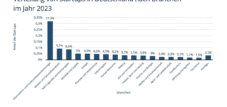
The important role of start-ups in the economy - drivers of innovation, job engine and indicator of economic growth - Image: Xpert.Digital
🌟 The role of startups in the economy in 2024 🚀
💼🔄 The dynamics of German start-ups in 2024: trends, challenges and opportunities
The development of start-ups in Germany will show both positive trends and ongoing challenges in 2024. In a dynamic economic environment, the German start-up ecosystem is an innovative but at the same time complex space in which founders and young companies have to assert themselves. It is important to understand current developments and industry trends, as well as the hurdles that founders face, in order to capture the full potential of this scene.
📊 Current developments
In the first half of 2024, the start-up climate in Germany recovered significantly. The number of new start-ups has increased by an impressive 15 percent compared to the previous half-year, meaning a total of 1,384 new start-ups. This increase reflects a new dynamism and confidence in the German start-up ecosystem, which was urgently needed after the difficult years of the pandemic and the associated economic uncertainty.
Berlin, Bavaria and North Rhine-Westphalia continue to lead the ranking of the federal states with the most new businesses. North Rhine-Westphalia (NRW) and Berlin in particular experienced a significant increase in the number of start-ups. In North Rhine-Westphalia the number of start-ups rose by 25 percent, while Berlin even recorded growth of 28 percent. This suggests that these regions are fertile ground for innovative ideas and entrepreneurship.
🔧 Industry trends
The German start-up landscape is strongly influenced by advancing digitalization. The software sector is booming and remains the central area for start-ups. Almost every fifth new start-up operates in this area. This corresponds to around 302 new companies in the software sector in the first half of 2024 alone. This development underlines the increasing importance of digitalization for all sectors of the economy, not just for technology companies.
Another key issue in the start-up world is sustainability. More and more young companies are aligning their business models with the green economy. Almost half of all new start-ups, around 46 percent, now belong to the green economy, which reflects the growing social and economic pressure to develop sustainable and environmentally friendly solutions. This includes areas such as renewable energy, sustainable mobility, environmentally friendly production methods and much more.
💰 Financing and funding
A crucial factor for the success of start-ups is the availability of financing options. The federal government has recognized this and taken ambitious measures as part of its start-up strategy. The so-called future fund was launched, through which a total of 10 billion euros is to be made available by 2030. By working with private investors, it is hoped to mobilize an additional 30 billion euros in venture capital. This is a significant step towards closing the funding gap that German start-ups often experience compared to leading start-up nations such as the USA or Israel.
The important funding programs in 2024 include:
INVEST grant for venture capital
This program encourages investors to invest venture capital in young companies and is intended to help improve the investment climate for start-ups.
Central Innovation Program for SMEs (ZIM)
This is a funding program for small and medium-sized enterprises (SMEs) that supports innovative projects and is also accessible to start-ups.
Horizon 2020 and the EU SME instrument
These EU programs offer additional funding opportunities for start-ups that want to assert themselves in an international context with innovative projects.
These measures are intended not only to support start-ups financially, but also to help Germany remain competitive in the international competition for the best ideas and talent.
⚠️ Challenges
Despite the positive developments, founders in Germany continue to face considerable challenges. One of the biggest hurdles is the still high level of bureaucratic effort. Many founders complain that the administrative effort in Germany is too high compared to other countries and creates unnecessary hurdles for market entry. Especially compared to countries like Estonia, which is known for its simple and digital start-up structure, Germany often performs less well.
In addition, the general business climate has deteriorated due to the recent global crises, which is also felt by start-ups. Economic uncertainty and rising costs – particularly in the areas of energy and raw materials – present many young companies with additional challenges.
Another problem remains the availability of venture capital. While government measures and new funds are steps in the right direction, Germany is still lagging behind in this area. Compared to the leading start-up nations, access to large investments in Germany is often more difficult. Investors tend to be risk-averse, which is particularly problematic in the early stages of a company's development. Many founders are therefore forced to look for alternative financing options or to look abroad where the investment climate is friendlier.
🚀 Outlook and future potential
Despite these challenges, the German start-up scene offers great potential for further growth. Digitalization and the increasing focus on sustainable business models open up enormous opportunities for innovation and new business ideas. The federal government's increased funding measures also help to improve the environment for start-ups and give them the necessary financial flexibility.
A particularly promising trend is the increasing focus on the green economy. Startups operating in this space not only have the potential to benefit from government support and growing investor interest, but they are also meeting growing demand from consumers and businesses looking for environmentally friendly alternatives. This area will play a key role in the coming years as pressure increases on all industries to operate more sustainably and develop solutions that support the transition to a climate-friendly economy.
In addition, Germany could further expand its position as a leading start-up location in Europe in the coming years. With the right mix of political support, good access to capital and an innovation-friendly environment, Germany could establish itself as an even more attractive location for start-ups. It is conceivable that Berlin in particular will position itself as a European Silicon Valley, not only in the area of technology, but also as a hub for sustainable innovation.
Another area with great growth potential is artificial intelligence (AI). In recent years, Germany has increasingly invested in this area, and many start-ups are now developing AI-based solutions for a wide range of industries, from healthcare to automotive. AI could prove to be one of the most important drivers of future innovation and play a key role in global competition.
🔭 The German start-up scene and the numerous opportunities
In 2024, the start-up scene in Germany will find itself caught between enormous potential and existing challenges. On the one hand, the positive developments in the areas of digitalization, green economy and government funding show that there are numerous opportunities for founders. On the other hand, hurdles such as bureaucracy and access to venture capital remain that need to be resolved to realize its full potential.
With the right decisions - both from the state and the private sector - Germany could further consolidate its role as a leading start-up country in Europe in the coming years and become a driver for innovations in key areas such as sustainability and artificial intelligence. The decisive factor will be whether it is possible to create an environment in which founders can implement their ideas quickly and unbureaucratically, and whether enough capital is provided to maintain the growth path.
📣 Similar topics
- 🚀🌟 Start-ups in Germany: Dynamics and challenges in 2024
- 📈🌍 Start-up climate 2024: Positive trends in Germany's start-up landscape
- 💡🌐 Innovation and sustainability: Industry trends in the German start-up ecosystem
- 🏙️📊 Regional growth engines: Berlin and North Rhine-Westphalia lead the way in new start-ups
- 🖥️💼 The boom in the software sector: Germany's pioneering role in 2024
- 🌱♻️ Green economy on the rise: sustainability as a business model
- 💰🏦 Financing strategies: future funds and venture capital for start-ups
- ✍️📃 Bureaucracy and hurdles: challenges for German founders
- 🌐🔬 Technological Advances: The Rise of Artificial Intelligence
- 🏆🇪🇺 Future vision: Germany's role as a leading start-up location in Europe
#️⃣ Hashtags: #StartupsGermany #Innovation #Sustainability #Venture Capital #Digitalization
📌 Other suitable topics
🚀 Startups play a significant role in the economy and are considered important for several reasons
🌟 Innovation drivers
Start-ups are considered important drivers of innovation. They often bring new technologies, business models and solutions to market that can disrupt existing industries or create entirely new markets[4]. Start-ups are often pioneers, particularly in the area of new technologies such as artificial intelligence - 52% of German start-ups state that AI is relevant to their business model.
💼 Job creation
Despite economic challenges, start-ups remain an important source of jobs. On average, German start-ups employ 19 people and plan to create an average of 8 more jobs in the next 12 months[4]. 56% of the start-ups surveyed were able to make new hires last year.
📈 Economic growth
Successful start-ups can contribute significantly to economic growth by opening up new markets, generating value and attracting capital. The ability to attract venture capital is considered an important success factor for start-ups and the entire ecosystem.
🔍 Indicators of the importance of start-ups
The following metrics are often used to evaluate the start-up ecosystem:
- Number of Unicorns: Start-ups with a valuation of over $1 billion
- Invested venture capital: volume and per capita investments compared to other countries
- Total exit volume: Proceeds from sales or IPOs of start-ups
- Number of employees: Average number of employees and job growth
- Innovative power: Proportion of start-ups that use new technologies such as AI
- Start-up activity: Number of new start-ups per year
Due to their innovative strength, job creation and growth potential, start-ups are considered important drivers for the competitiveness and future viability of an economy. The indicators mentioned help to assess the strength and development of the start-up ecosystem.
📥📄💾 More about this here: Startup Trends (PDF) and Startups in Germany (PDF
We are there for you - advice - planning - implementation - project management
☑️ Start-up and industry expert, here with its own Xpert.Digital industry hub with over 2,500 specialist articles
I would be happy to serve as your personal advisor.
You can contact me by filling out the contact form below or simply call me on +49 89 89 674 804 (Munich) .
I'm looking forward to our joint project.
Xpert.Digital - Konrad Wolfenstein
Xpert.Digital is a hub for industry with a focus on digitalization, mechanical engineering, logistics/intralogistics and photovoltaics.
With our 360° business development solution, we support well-known companies from new business to after sales.
Market intelligence, smarketing, marketing automation, content development, PR, mail campaigns, personalized social media and lead nurturing are part of our digital tools.
You can find out more at: www.xpert.digital - www.xpert.solar - www.xpert.plus

